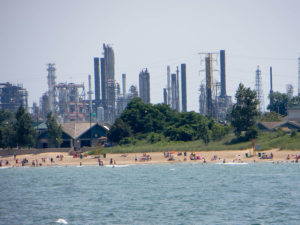
More than Century-Old BP Whiting, Ind., Refinery Must Also Increase Pollution Controls to Reduce Soot-Like Particles
Hammond, Ind. – BP must pay $512,450 in penalties and increase the use of air pollution control systems at the more than century-old BP Whiting Refinery on Lake Michigan as part of an agreement released today that resolves a lawsuit filed by environmental organizations.
The oil refinery in Northern Indiana, one of the nation’s largest and oldest, was sued in federal court in 2019 by the Sierra Club, NRDC (Natural Resources Defense Council), Environmental Integrity Project and allies for repeatedly violating legal limits on soot (fine particle pollution), which can trigger asthma and heart attacks. The refinery also failed to promptly report and correct illegal emissions from petroleum processing units called “catalytic crackers,” and failed to operate air pollution control equipment at all times.
The U.S. Department of Justice joined in the negotiations over the case on behalf of EPA in October 2020 and both federal agencies worked with BP and the environmental groups to reach the agreement lodged in federal court today.
In addition to payment of a $512,450 civil penalty, the settlement requires significant improvements in the monitoring and reporting of fine particle emissions and in the operation of pollution control systems designed to reduce such pollution.
“Today’s agreement should significantly reduce fine particle pollution from BP’s refinery, and ensure that violations of emission limits are reported and quickly corrected,” said Eric Schaeffer, Executive Director of the Environmental integrity Project. “While environmental groups initiated the enforcement actions that led to the settlement today, we greatly appreciate the hard work by the U.S. EPA and Justice Department to bring it across the finish line,” said Schaeffer, former Director of Civil Enforcement at EPA.
Amanda Shepherd, Director of the Hoosier Chapter of the Sierra Club, said: “By holding BP Whiting accountable for their repeated violations of the Clean Air Act, this settlement will provide important protections for the thousands of people living within three miles of the Whiting refinery, of which the majority are Black or Latinx. This consent decree serves as an important win for environmental justice in Northwest Indiana that we hope to build upon to provide a healthier and more equitable environment for all.”
Margrethe Kearney, Senior Attorney at the Environmental Law & Policy Center, said: “These are important protections for communities already overburdened by pollution. We will continue to be vigilant in ensuring that this facility, located on the shores of our Great Lakes, operates under the standards it has agreed to.”
Ann Alexander, Senior Attorney for NRDC, said: “Our fight against BP’s pollution has gone on way longer than it should have,” said “We sued them in 2008 for Clean Air Act violations, reached an agreement with them to curb emissions in 2012, and now here we are in 2021 reaching another agreement after they violated the first one. Let’s hope this settlement is the end of the matter.”
The Whiting Plant, which sprawls over 1,400 acres in Whiting, East Chicago, and Hammond, Indiana, is the sixth largest refinery in the U.S. and has a capacity of more than 400,000 barrels per day. It was originally built in 1889 by Standard Oil.
Several environmental organizations sued BP in September of 2019, alleging that BP’s own stack tests showed that its catalytic crackers had failed to meet particulate limits for a number of months in 2016, 2017, and 2018. The refinery also had failed to operate pollution controls at both units at the required power level for at least 3,481 hours (or the equivalent of almost five months) from 2015 to 2019.
That lawsuit to enforce emission limits and pollution control requirements that protect people living downwind was filed by the Environmental Integrity Project, the Sierra Club’s Hoosier Chapter, NRDC, and the Environmental Law and Policy Center.
In the amended consent decree released yesterday, BP must conduct stack testing at least once every six months; operate its pollution control systems more often, including in almost all circumstances when its catalytic crackers are emitting particulate matter, and promptly disclose and correct any failure to do so; and follow new testing requirements to ensure more accurate measurement of soot released during startup or maintenance of these units.
For a copy of the amended consent decree, click here.
The Environmental Integrity Project is a 19-year-old nonprofit organization, based in Washington D.C. and Austin, Texas, dedicated to enforcing environmental laws and strengthening policy to protect public health and the environment.
The Sierra Club is America’s largest and most influential grassroots environmental organization, with more than 3.5 million members and supporters.
NRDC (Natural Resources Defense Council) is an international nonprofit environmental organization with more than 3 million members and online activists. Since 1970, our lawyers, scientists, and other environmental specialists have worked to protect the world’s natural resources, public health, and the environment.
The Environmental Law & Policy Center is the Midwest’s premier environmental legal advocacy organization. We use the power of the law and strategic advocacy campaigns to create climate change solutions, advance clean energy, protect public health, and preserve the Midwest’s wild and natural places.
Media contacts: Tom Pelton, Environmental Integrity Project, (443) 510-2574 or tpelton@environmentalintegrity.org
Josh Mogerman, NRDC, (773) 531-5359 or jmogerman@nrdc.org


